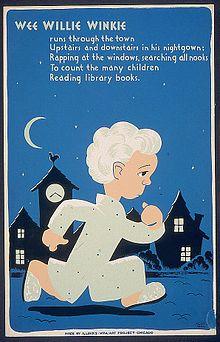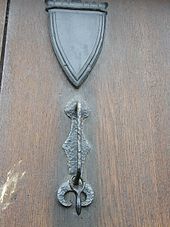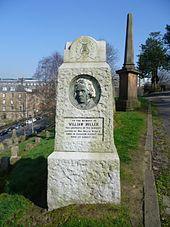| "Wee Willie Winkie" | |
|---|---|
 1940 WPA poster using Wee Willie Winkie to promote children's libraries | |
| Nursery rhyme | |
| Language | Scots |
| Published | 1841 |
| Lyricist(s) | William Miller |
"Wee Willie Winkie" is a Scottish nursery rhyme whose titular figure has become popular the world over as a personification of sleep. The poem was written by William Miller and titled "Willie Winkie", first published in Whistle-binkie: Stories for the Fireside in 1841.[1][2][3] It has a Roud Folk Song Index number of 13711.
Lyrics
The original text of 1841 in Scots, and a paraphrased version for English-language readers (from 1844) are below:
Origins and meaning
The poem was written by William Miller (1810–72), first printed in Whistle-binkie: Stories for the Fireside in 1841 and re-printed in Whistle-Binkie; a Collection of Songs for the Social Circle published in 1873.[1][2][3][5] In Jacobite songs Willie Winkie referred to King William III of England, one example being "The Last Will and Testament of Willie winkie"[6] but it seems likely that Miller was simply using the name rather than writing a Jacobite satire.[5]
Such was the popularity of Wee Willie Winkie that the character has become one of several bedtime entities such as the Sandman, Ole Lukøje of Scandinavia, Klaas Vaak of the Netherlands, Dormette of France[7] and Billy Winker in Lancashire.[8]
Notes
- ^ a b Cunningham, Valentine. The Victorians. Retrieved 3 May 2013 – via Google Books.
- ^ a b "William Miller". Scottish-places.info. Retrieved 3 May 2013.
- ^ a b "Dennistoun online". Dennistoun.co.uk. Retrieved 3 May 2013.
- ^ Carrick, John Donald; Rodger, Alexander (1842). "Willie Winkie". Whistle-binkie; a collection of songs for the social circle. Retrieved 1 June 2010.
- ^ a b c I. Opie and P. Opie, The Oxford Dictionary of Nursery Rhymes (Oxford: Oxford University Press, 1951, 2nd edn., 1997), pp. 424–5.
- ^ "Full text of "A Dictionary of Lowland Scotch, with an introductory chapter on the poetry, humor, and literary history of the Scottish language and an appendix of Scottish proverbs"". Archive.org. Retrieved 3 May 2013.
- ^ C. Rose, Spirits, Fairies, Gnomes, and Goblins: an Encyclopedia of the Little People (ABC-CLIO, 1996), p. 231.
- ^ Briggs, Katharine (1976). An Encyclopedia of Fairies. Pantheon Books. pp. 24, 429. ISBN 0394409183.
External links
- Scottish Nursery Songs and other Poems by William Miller at Dennistoun online, includes Wee Willie Winkie
- Whistle-Binkie; a Collection of Songs for the Social Circle edited by John Donald Carrick, Alexander Rodger, David Robertson, contains Willie Winkie and the autograph of Miller (1873)

